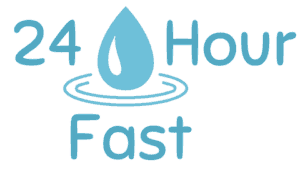Intermittent fasting can provide a lot of benefits, like blood sugar control, insulin resistance prevention, weight loss, cell repair, brain function protection, or autophagy. But one significant barrier that can make you give up on your fast is hunger. How can you curb your appetite while fasting? Let’s dive into this and see the best 12 appetite suppressants to use when intermittent fasting.
1. Green tea
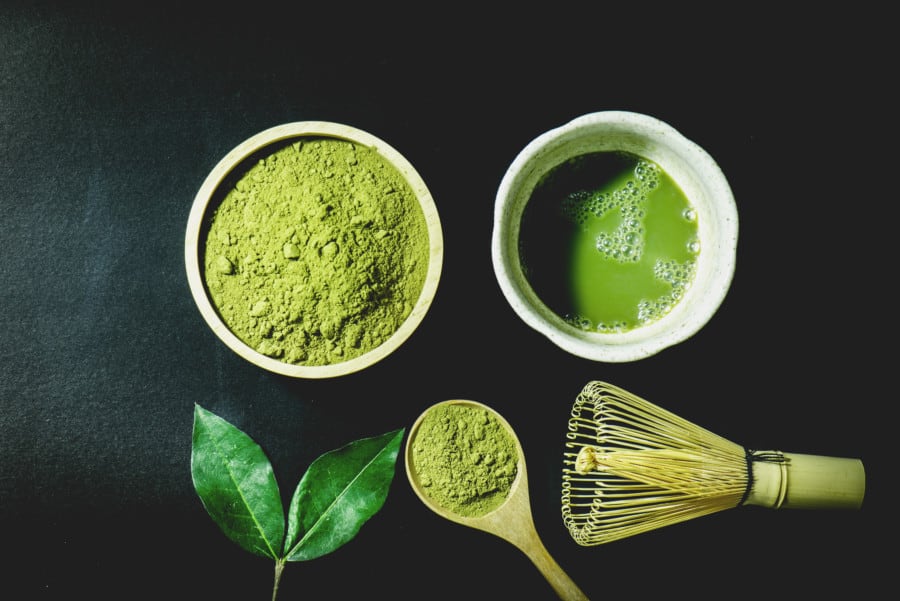
Tea is rich in antioxidants and particularly green tea which contains a high concentration of EGCG, known as Epigallocatechin gallate. It can also be found in white tea and black tea but in a smaller amount.
EGCG induces the secretion of cholecystokinin, a hormone responsible for slowing down the intestinal mobility. The food moves slower through the digestive system, which induces the sensation of being full for a longer time.
By triggering this hormone, EGCG-rich food like tea and especially green tea will induce a sensation of fullness. That is why green tea is a great drink to have when fasting to reduce that appetite feeling. Matcha tea, in particular, has a high concentration of EGCG.
2. Coffee

Coffee is known to be an efficient appetite suppressant. Interestingly, research showed that this is not the caffeine that we usually look for in coffee that drives this effect. Indeed, decaffeinated coffee actually had more impact on lowering hunger than the caffeinated one.
This is related to the phytochemical compounds called chlorogenic acids, abundant in green and roasted coffee beans. Those acids have been shown to significantly decrease body weight, abdominal fat, and visceral fat.
Using coffee to curb appetite can be a great strategy. And as we saw, decaffeinated options are even more effective for that purpose. However, if you want to combine that hunger curbing effect with the caffeine stimulating effects, regular coffee will definitely work as well.
Make sure you drink your coffee black and don’t add sweeteners or creamers inside. It would increase the calorie impact and may trigger an insulin response. That would impact your fasting state and this is not what you want here when reaching for that cup of coffee.
3. Water

This may seem basic but drinking enough water is key while intermittent fasting. Staying well hydrated will not only benefit your cells, tissues, and organs but also improve your energy level.
More often than not, we consume less water than we should. Also, when fasting, the water amount that we would usually get from our food, which is around 20 to 30% of the fluids needed, has to be replaced by direct water intake.
We also sometimes misinterpret thirst signals as hunger. If you feel hungry during your fast, the first course of action is to make sure you are well hydrated by drinking some water. Drinking water will fill your stomach and make you feel more full as well.
The total amount of water you need varies depending on many factors but is somewhere around 2 to 4 liters per day. Keeping a refillable bottle of water next to you at any time, whether you are working or running errands, is the easiest way to remind yourself to drink and stay well hydrated.
And if you get tired of drinking only flat water, you can mix things up with carbonated water. As long as it is unsweetened and doesn’t contain any calories, it won’t break your fast and will help decrease your appetite.
4. Apple cider vinegar
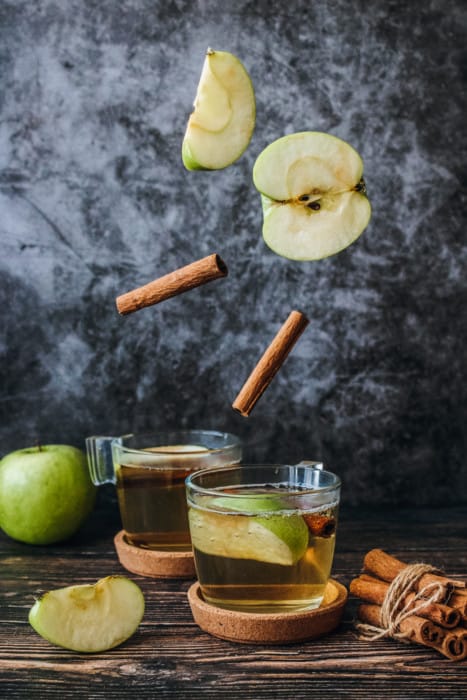
Apple cider vinegar has different benefits but one of them is to lower the glycemic index of foods taken in conjunction, making them more filling. This is due to the acetic acid that it contains.
Now, while you are in your fasting window, there is no food ingested so this benefit won’t help you much. Though it contains hardly any calorie so mixing it in water during your fast is ok. But it can be an interesting effect to use right before eating a meal, in general, to have better hunger management overall. As well as before the last meal of your eating window.
5. Cinnamon

If you like the taste of cinnamon, it can be added to some of your drinks while you fast to mix up the tastes a little bit. It has various health benefits, but among them, its link to insulin is what is most interesting here in appetite management.
It emulates insulin within the body by acting like insulin but without the presence of food. The polyphenol it contains activates a specific part of the brain, the Ventral Tegmental Area, which as a consequence indicates that you are full.
Feel free to add a pinch of cinnamon to your tea or other drinks while fasting, a small amount doesn’t contain many calories and won’t break your fast. But it can help you reduce that hunger feeling.
6. Ginger

Ginger is another spice that can be used while fasting. Fresh ginger or powder ginger can be added to your tea or drink in a small amount. It is rich in gingerol and shogaol, two compounds that have antioxidant and anti-inflammatory properties.
In addition, it is been shown that ginger may reduce feelings of hunger. If you like the taste of ginger (I personally love it), it can be powerful to reduce your appetite during fasting.
7. Cocoa powder
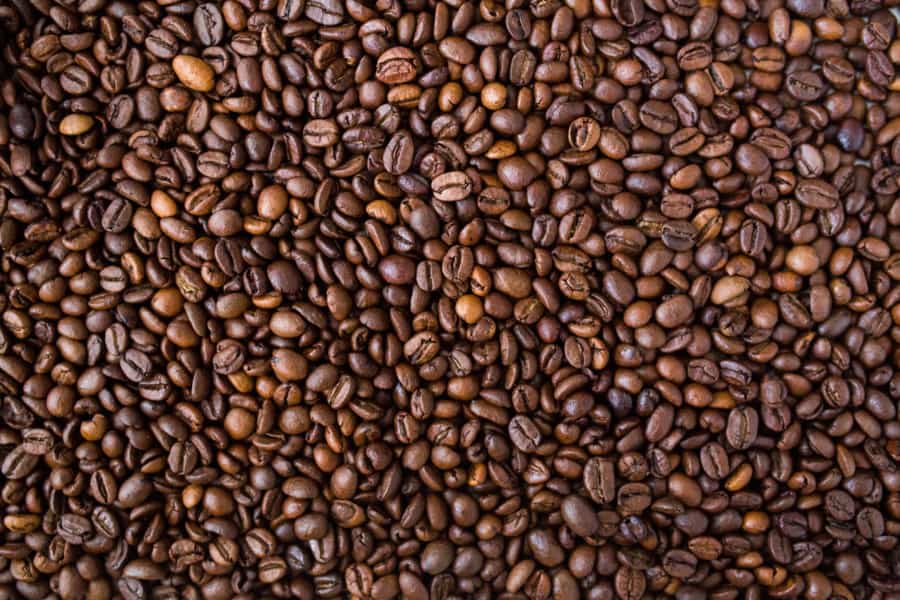
Cocoa powder might seem surprising when it comes to suppressing appetite. It is often confused with chocolate while the two products are different. Chocolate is indeed made of cocoa but can also have lots of sugar, butter, and other added ingredients to it.
Cocoa powder is just made of ground cocoa beans, without added sugar or fat. It can be added to a lot of drinks in general, but while fasting, hot water is what we will want. Make sure you choose a high-quality product, with no added sugar, as pure as possible. One tablespoon is usually equivalent to 10-15 calories.
It’s been suggested in some research that dark chocolate and cocoa can lower ghrelin levels, which is a hormone known as the “hunger hormone”, stimulating appetite.
If you are tired of drinking another coffee or tea, that can be a good option. Of course, it contains a little bit more calories, so it is best to keep as a secondary option when hunger becomes stronger.
8. Peppermint
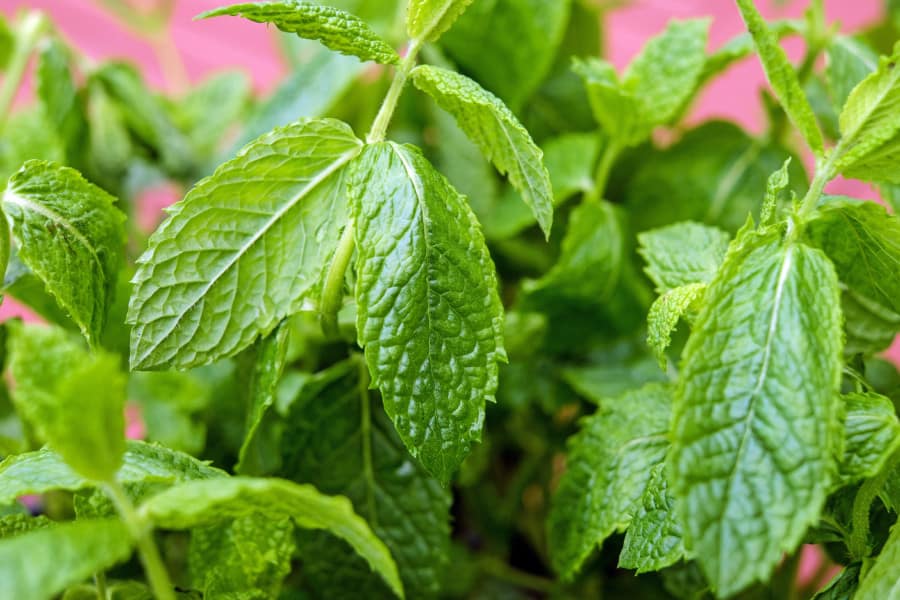
Peppermint has lots of different benefits, one of them being curbing hunger. Yes, it is known to reduce cravings and appetite. You can combine the effect of tea and peppermint by drinking peppermint tea. You can have the leaves from the plant itself to smell or use in an infusion. Or it can also be used in the form of essential oil, diffused in the air using an essential oil diffuser.
Before using peppermint and/or essential oil, research the contraindications as peppermint itself shouldn’t be used by some people with specific medical conditions, and essential oil, in general, is not recommended for some population (pregnant women, babies, children). If it is safe for you to use after your research (and if any doubt, ask your medical practitioner), it can be a powerful tool to use when hunger hits during your fast.
9. Eating a healthy and balanced diet during your eating window
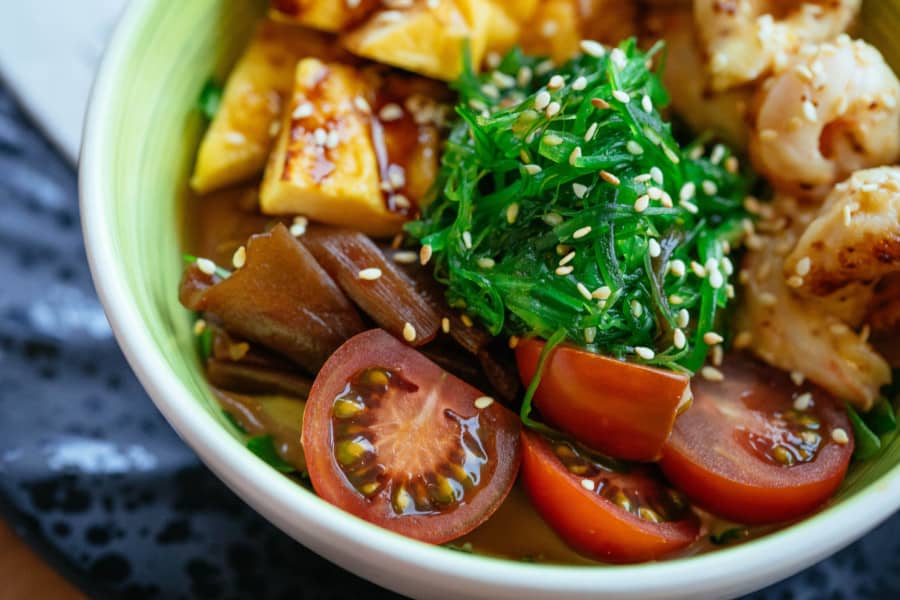
Up to now, we focused on what you can have while you feel hungry during your fast. But an important part of managing your appetite during your fast actually comes from your behavior during your eating window.
Your fast will be much easier if you eat a healthy and balanced diet for the rest of the time. Making sure you eat enough will ensure that you don’t feel hungry or at least not as much when your fast comes.
Focus on eating whole foods, with a balance of healthy fats, proteins, and complex carbohydrates. There are a lot of different healthy types of diets out there and my goal is not to recommend you a specific one here. But overall, one common factor is to focus on a plant-based eating style. Including whole foods and with as few processed foods as possible. Whether you want to incorporate meat, fish, and other animal products or not is up to you.
Once you have a balanced and fulfilling diet that brings you the macro-nutrients, micro-nutrients, and vitamins your body needs, it becomes much easier to practice intermittent fasting.
10. Stay busy
It can be hard not to think about something else when all your brain is doing is thinking about food. Indeed, when you are used to eating at a certain time, your cravings for food will get stronger as it gets closer. This is especially true in the first few weeks of starting a new eating schedule.
The best strategy, in that case, is to keep busy, specifically at those hours. Schedule a work call, a friend call or dive deep into that project you are working on. Anything that can take your mind off this hunger feeling for a bit. And you will realize after a short while that this seeming hunger comes much more from a habit than from physical hunger.
If you are not home while fasting, try to avoid going too close to places like bakeries, coffee places, food courts or restaurants as much as possible. Even more importantly at the times you usually used to eat.
This is specifically true in the first few weeks of your intermittent fasting practice. After a while, it will become naturally easier as your body and mind will become accustomed to that new routine.

11. Get enough sleep
We don’t necessarily gravitate towards sleep when we talk about hunger, food, or fasting. But sleep has been shown to be highly related to our hunger feelings.
When you are sleep deprived, your body will naturally default to a hunger mode. It translates into a higher level of ghrelin (the ‘hunger’ hormone) and a lower level of leptin (the ‘satiety’ hormone). In addition, it has been shown by a study done by Matthew P. Walker, author of the book ‘Why we sleep’, that a significant desire for weight-gain promoting foods is associated with sleep deprivation. That means our brain will naturally want us to reach out for that donut instead of that healthy salad bowl when we are tired.
One of the most important factors that you can control to better manage your appetite is to make sure you get enough sleep. It is one of the best appetite suppressant technique while intermittent fasting. And it just requires you to sleep!
It won’t be beneficial just for your hunger management but will have a tremendous positive impact on the other areas of your life as well.

12. Exercise
By exercise here, it doesn’t necessarily mean an intense HIIT workout or a 10-mile run. Exercising without food is feasible but your body needs to be adapted to use fat as a fuel.
If you are used to fasting and have done it dozens of times for the same duration, then you can indeed exercise as you would regularly do. However, if you are new to intermittent fasting or going for a longer fast than usual, it is best to keep the intense workout for another time. But exercise can also mean going for a short walk or just doing a few stretches or yoga moves. It doesn’t have to be too intense.
Some research suggests that hunger is suppressed during a short while after exercising. However, it is temporary and is also largely dependent on the intensity and type of workout performed.
Light movement practice can still be a good option if you are towards the end of your fast and can eat shortly after. Don’t force it, keep it easy though if you are not used to workout without fuel. It will keep your mind busy, your body moving and you can refuel after that when your fast ends.

Stop fasting if you don’t feel well
It is normal to feel some small discomfort during your fast. Especially when you are new to intermittent fasting, starting a new schedule or doing a longer fast than usual. Being a bit tired or hungry is normal.
However, you should never feel unwell. If exhaustion is too strong, you experience nausea or confusion, or your heartbeats change, you should stop fasting right away. And if symptoms continue, you should seek medical help.
Consider increasing your fasting time little by little, your body can adapt but you have to give it time. Also, extended fasts over 36 hours should be done with medical practitioner supervision or recommendation.
Conclusion
Hunger is usually an issue in the first few weeks of starting intermittent fasting or when undertaking a longer fast than usual. Your body gets used to your new eating routine after a while. Hopefully, the appetite suppressants detailed above will help you manage better those moments where hunger knocks at the door.
Don’t try to incorporate all of them in your regimen but rather choose a few that are easily actionable for you. And keep them as your secret weapons for your next fast!
The information we provide at 24hourfast.com is not intended to replace a consultation with a qualified medical professional. By interacting with this site, you agree to our disclaimer.
